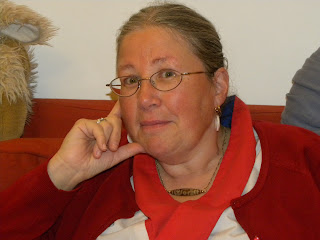 |
| circa 2010 |
There were a lot of entries for the limerick competition and mine was not placed, but my essay earned a third place. When I sat down to write I surprised myself. I could not think of who I would most like to meet that I felt I could make into an interesting essay, except . . .
 |
| circa 1960 |
Could I—through meeting myself—understand these confusions and learn how they could be worked out? What is it about a turn of phrase that causes irritation? Why is it that a certain manner of being produces a less than friendly response? What am I projecting that is different to my intention? If I met myself I could see how that functioned.
I think that somehow it would have to be arranged that I was meeting myself without knowing that it was me. I guess I would have to be in disguise . . . and yet, would I recognise myself anyway? Photographs reveal so many different angles of my image, but would I recognise myself in person? I see myself in the mirror every day but a mirror image is not the same as face-on. I have only seen myself on video a few times and found that to be quite surprising – I moved differently to how I imagined. The reality of anyone’s appearance is far deeper than a momentary captured image, so my glances in the mirror cannot truly tell me what I look like. Recently I was going through old photographs of myself in my teens and twenties. I now feel that I looked rather delightful, and yet at that time I had thought myself to be fat and ugly.
I can imagine a number of advantages to the experience of meeting myself. Through getting to know my alternative me I could find out whether I liked myself. Am I fun and interesting to spend time with? Do I dominate a conversation or join in too little? Am I friendly and warm? Certainly I have my own ideas about the type of person I am, but viewed from the inside it is difficult to be objective. If I discovered that I did not appear to be a warm or welcoming person on first encounter, this would give me the opportunity to change. The things that I didn’t like, I could note for future reference and see how I could work on them.
 |
| circa 1970 |
I think, in the end, it is a bad idea. The only way to know whether I am the person I want to be, is to be aware of the reflections I receive from others, and to be able to recognise when that reflection is open or closed. Open reflections arise from people who are receptive to experiencing the me-ness of me. Closed reflections arise when something gets in the way of receptivity so that the reflection bounces off a preconception or prejudice. If I were to meet myself, the copy-me would still carry my baggage of preconceptions and prejudice, so my doppelgänger would not offer a more objective view of me than I currently experience.
So . . . let’s start again . . . the person I would most like to meet is YOU! And I promise to be as receptive to you as possible and reflect you as warmly and openly as possible, so that you like the you that you see through me!
Thanks. Glad you enjoyed it.
ReplyDeleteLove this :)
ReplyDeleteThank you. I have not been part of the WI for many years now, so it was interesting for me to see this post again.
DeleteLove this :)
ReplyDelete